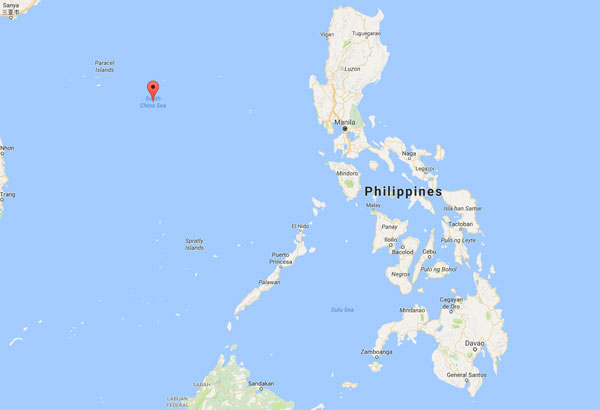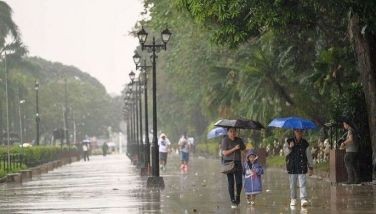Rody ready to set aside ruling on sea dispute

Surveillance photos released this week by the Asia Maritime Transparency Initiative (AMTI) of the Washington-based Center for Strategic International Studies (CSIS) showed that China installed what appeared to be close-in weapons systems (CIWS) on seven artificial islands it built in the disputed sea. Googlemaps
MANILA, Philippines – President Duterte said yesterday he was ready to set aside the arbitral ruling that voided China’s expansive maritime claim in the South China Sea following reports that Beijing had installed weapons systems in seven disputed areas it has occupied.
Surveillance photos released this week by the Asia Maritime Transparency Initiative (AMTI) of the Washington-based Center for Strategic International Studies (CSIS) showed that China installed what appeared to be close-in weapons systems (CIWS) on seven artificial islands it built in the disputed sea.
The artificial islands were built on Kagitingan (Fiery Cross), Panganiban (Mischief), Zamora (Subi), Burgos (Gaven), Kennan (Hughes), Mabini (Johnson) and Calderon (Cuarteron) Reefs, areas located off the western province of Palawan.
AMTI said the gun and CIWS emplacements would show that China “is serious about defense of its artificial islands in case of an armed contingency in the South China Sea.”
The Philippines, which once challenged China’s expansive maritime claim before an international arbitral court, is not keen on stopping Beijing’s actions.
“In the play of politics, now, I will set aside the arbitral ruling,” Duterte said in a press conference in Davao City early morning yesterday upon arrival from state visits to Cambodia and Singapore.
“I will not impose anything on China. Why? Because the politics here in Southeast Asia is changing,” he added.
Duterte elaborated on the changing politics in the region by reiterating his threat to remove American troops from the Philippines. He first issued the threat after the United States raised concerns over his brutal war on illegal drugs, which so far left over 5,000 drug suspects dead.
“I will demand that they go out of my country. What’s the use of keeping, hosting them when they think we are a bunch of criminals?” the President said.
“Go, go out. If you do not believe in us, why deal with us?”
Duterte’s position on the South China Sea issue was a radical shift from that of his predecessor Benigno Aquino III, who was very vocal in criticizing China’s expansion in the South China Sea.
China, which claims about 90 percent of the South China Sea, has launched an ambitious land reclamation program in seven reefs that are also being claimed by the Philippines.
In 2013, the Philippines under Aquino challenged China’s expansive claim before an international arbitral court but Beijing refused to participate in the hearings.
The tribunal ruled in favor of the Philippines last July and declared that China’s claim in the South China Sea has no legal basis. China has described the ruling as “null and void” and dismissed it as a “mere piece of paper.”
Last Friday, Foreign Affairs Secretary Perfecto Yasay Jr. said the Philippines could not stop China from installing weapons in the artificial islands. He said the Philippines wanted to make sure that there would be no actions that would create tensions with China.
“We cannot, we cannot stop China at this point in time and saying ‘do not put that up’ – we will continue to pursue peaceful means at which all of this can be prevented,” Yasay said in a press conference in Singapore.
His remarks differed from Defense Secretary Delfin Lorenzana, who expressed concerns over the CSIS report and said the government was attempting to verify it.
“If true, it is a big concern for us and the international community who uses the South China Sea lanes for trade,” Lorenzana said Thursday. “It would mean that the Chinese are militarizing the area, which is not good.”
Yasay maintained though that the Philippines would continue to stand on the arbitral tribunal’s decision.
Friendly coast guards
Meanwhile, the Philippine Coast Guard (PCG) and the Chinese Coast Guard (CCG) have agreed to form a Joint Coast Guard Committee (JCGC) that would deepen friendly cooperation between the two maritime agencies.
In a statement, PCG spokesman Commander Armand Balilo said once the JCGC was established it would serve as an avenue for both coast guards to strengthen mutual trust, deepen confidence, intensify communications and exchange, enhance friendly cooperation based on equality, reciprocity and consensus.
The agreement was reached during the first meeting between the two coast guard agencies on Friday since CCG was established in June 2014.
During the past few years there had been instances when the relationship between the two countries was strained due to conflicting claims over the West Philippine Sea.
In their first meeting, the PCG said the two agencies had a friendly exchange of views on the establishment of the JCGC, including the principles of the organizational structure, terms of references and operational procedures.
They also explored possible programs of maritime cooperation, including combatting drug trafficking and other maritime crimes, marine environmental protection, maritime search and rescue, and capacity-building in related areas.
It was also proposed that an interim arrangement for a hotline between the two agencies be put up to expedite the response during search and rescue operations.
Balilo cited the case of the two Filipino fishermen who went missing late November and were rescued by Chinese fishermen, who turned them over to the CCG.
He added there had been previous instances when the Chinese embassy would call the PCG and seek assistance to locate missing Chinese fishermen or when there were those requesting that they be allowed to take shelter during bad weather.
Once a hotline is created, the PCG official said they would be able to save on precious time since “during these search and rescue operations time is of the essence.”
Balilo said the PCG and CCG could dispense with the need to course their requests through their embassies and directly relay their request to their counterpart coast guard.
On the part of the PCG, the hotline can be set up at its action center.
The first organizational meeting took place last Dec. 15 to 16 in Manila. Representatives from the Department of Foreign Affairs (DFA), the Office of the Foreign Affairs Leading Group of the Communist Party of China Central Committee and the Chinese Ministry of Foreign Affairs were also present.
The PCG and CCG meeting was the result of a memorandum of understanding signed in the presence of President Duterte and Chinese President Xi Jinping during Duterte’s visit to China last Oct. 18 to 21.
The second organizational meeting and the inaugural meeting of the JCGC is scheduled in February next year here in the country. – Evelyn Macairan, AP
- Latest
- Trending
































